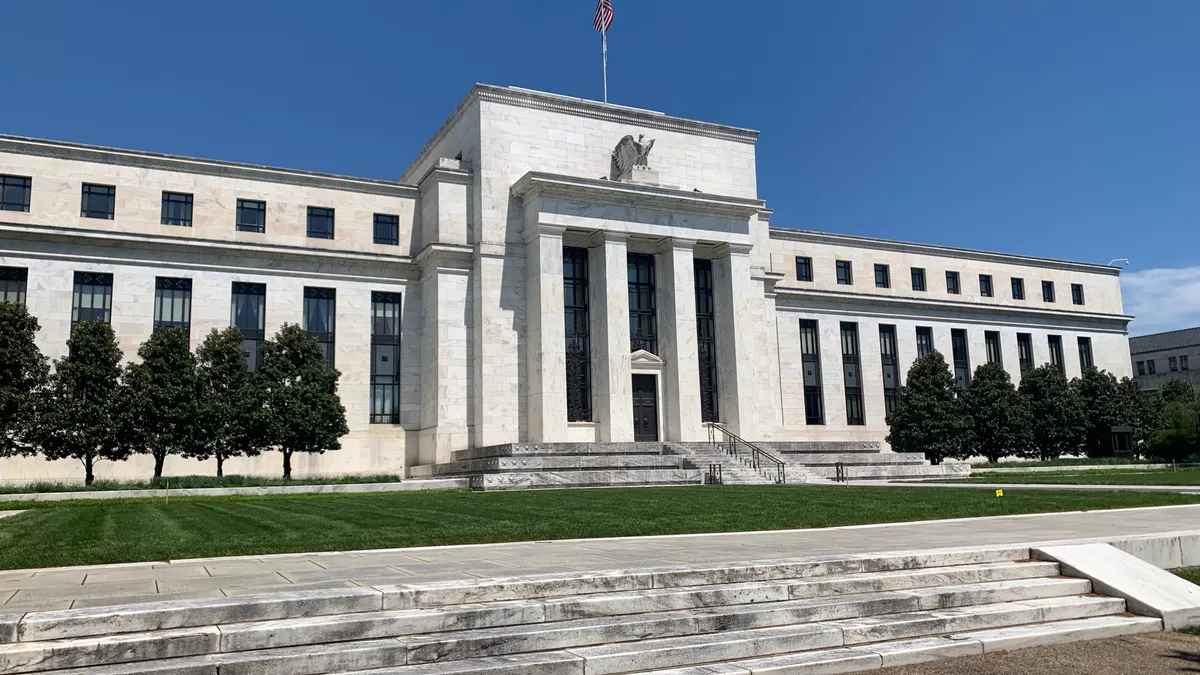Dive Brief:
- The U.S. Chamber of Commerce sent a letter Thursday to the Senate Banking Committee, airing worries about Sarah Bloom Raskin, President Joe Biden’s pick for the open vice chair of supervision post at the Federal Reserve.
- “Is it the role of the Federal Reserve to direct capital away from certain industries that are politically disfavored or direct capital toward industries that are politically favored?” Tom Quaadman, the chamber's executive vice president for capital markets competitiveness, asked in the letter, referencing a May 2020 op-ed Raskin wrote in The New York Times, criticizing the central bank and Treasury for allowing oil, gas and coal companies to receive government-backed emergency-lending relief early in the COVID era.
- The letter comes on a day when a high-ranking bank executive, Goldman Sachs Chief Operating Officer John Waldron, also publicly critiqued the Fed, questioning its independence — in reference to interest rates during a virtual speech to New Jersey pension fund managers.
Dive Insight:
Quaadman, in his letter, asked Senate Banking Committee Chair Sherrod Brown, D-OH, and ranking member Pat Toomey, R-PA, to "secure a commitment from Ms. Raskin to maintain the political independence of the [Federal Reserve Board of Governors] and stay committed to its statutory mission.”
A nomination hearing for Raskin and two other Fed nominees, Lisa Cook and Philip Jefferson is set for Feb. 3.
Toomey likely is already planning a line of questioning to that respect. He has been vocal in his concern that the central bank, if the current slate of nominees is confirmed, would have little experience in dealing with the energy sector — or consideration for it.
"The demonstrated hostility of one nominee, Sarah Bloom Raskin, toward a sector that supports employment for millions of Americans, is unacceptable,” he wrote in a letter to Biden this week.
Energy trade groups including the U.S. Oil & Gas Association also wrote a draft letter this week opposing Raskin’s nomination, Bloomberg reported Tuesday.
“She is a strong advocate for debanking the very industry that powers America,” the groups wrote. “Her multiple public statements indicate an agenda at odds with the president’s goal of providing Americans with reliable, affordable energy.”
Toomey's concern isn't limited to Raskin. The senator asked the nominee for the Fed's other vice chair role, Lael Brainard, at her hearing, whether her support for more climate research and analysis at the Fed was "a precursor to direct capital away from" fossil-fuel companies.
"We would not tell banks which sectors to lend to or not lend to, but we do want to make sure they are measuring, monitoring and managing [their] material risks,” Brainard said.
But Toomey voiced his concern with Raskin in particular as soon as she was nominated.
“Sarah Bloom Raskin has specifically called for the Fed to pressure banks to choke off credit to traditional energy companies and to exclude those employers from any Fed emergency lending facilities,” Toomey said in a statement this month. “I have serious concerns that she would abuse the Fed’s narrow statutory mandates on monetary policy to have the central bank actively engaged in capital allocation.”
Raskin's New York Times op-ed has been referenced enough by those who may lean toward opposing her that it bears comparison to public comments former Office of the Comptroller of the Currency nominee Saule Omarova made on bank oversight, which some Republicans deemed "radical." Omarova faced a contentious Capitol Hill hearing in November, then withdrew her nomination weeks later.
Quaadman drew a parallel between his concern over Biden’s Fed nominees and a major power struggle at another regulator: the Federal Deposit Insurance Corp.
“After the recent push by Board members at the [FDIC] to usurp the Chair’s authority, we have serious concerns about similar politicization at the Federal Reserve,” Quaadman wrote Thursday.
Two Democratic members of the FDIC board — Consumer Financial Protection Bureau (CFPB) Director Rohit Chopra and former FDIC Chair Martin Gruenberg — published a review of bank merger policies last month without the approval of FDIC Chair Jelena McWilliams, a Republican. At the heart of the debate is whether the chair alone controls the board’s agenda, or if a majority of directors can. McWilliams resigned in December.
Goldman's Waldron, meanwhile, questioned the Fed’s strength to act as an “independent, monetary policy engine that is doing what it thinks is right and not what’s expedient.”
“They have a chance here to do that, but I am a little worried about whether they’ll stand up and do it,” he said Thursday, according to Bloomberg.













